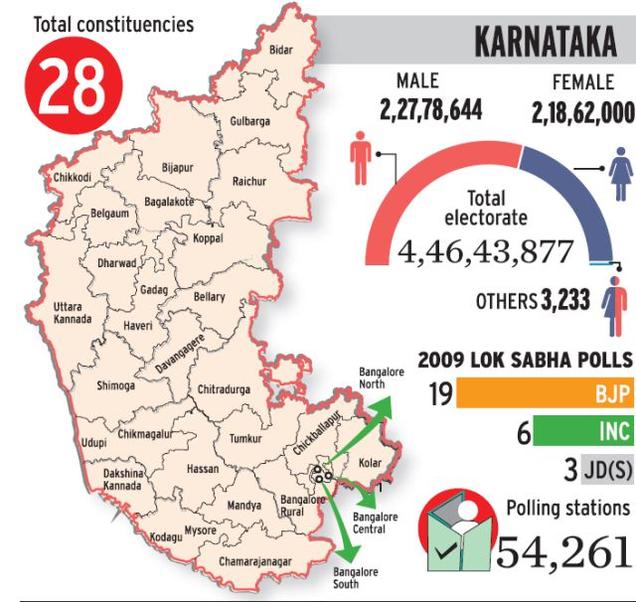The elections to 28 constituencies of the Lok Sabha in Karnataka portend to be of the same variety that has been witnessed over the last four general elections — a bipolar contest between the Bharatiya Janata Party and the Congress, although the Janata Dal (Secular) is taking all steps to stay afloat.
Tight contest
After a relatively poor performance in the May 2013 Legislative Assembly elections, the BJP has surged forward in the run-up to the Lok Sabha elections. Reports emanating from the constituencies and those closely following the campaign and the response of the electorate say that the two national parties will face a close contest in at least 25 of the 28 constituencies.
There is, however, no wave either in favour of the Congress or of the BJP. It is quite obvious that the re-entry of the former Chief Minister, B.S. Yeddyurappa, has tipped the balance in favour of the BJP.
Mr. Yeddyurappa, however, does not have the same command he enjoyed in 2009 in the party and with the electorate; the Lingayat community in particular of which he is an important leader.
Another heavyweight who has returned to the BJP fold is B. Sriramulu, an associate of the Reddy brothers of Bellary. Mr. Sriramulu has been fielded from Bellary as he wields considerable influence in four adjoining constituencies.
Raring to go
Contrary to popular belief that the Congress will sweep the Lok Sabha elections in Karnataka, replicating its performance in the Assembly elections, the emerging picture is that the BJP is giving the Congress a run for its money in almost all the seats. There is also the likelihood that the BJP may emerge with a few more seats than its rival. However, it is highly unlikely that it will put up a better show than in 2009 when it won 19 seats, a shade better than its performance in 2004 when it won 18 seats.
The former Chief Minister, Jagadish Shettar, who exerted pressure on the BJP high command to approve the re-entry of Mr. Yeddyurappa and Mr. Sriramulu told The Hindu that given the candidates and the response of the electorate, a direct contest between the two national parties was on in at least 22 constituencies. He said there was a triangular contest in the remaining six —Hassan, Mysore, Mandya, Tumkur, Bangalore rural and Chickballapur. Mandya that forms a part of the Vokkaliga belt is a bastion of the Congress and the Janata Dal(S).
Chief Minister Siddaramaiah and Karnataka Pradesh Congress Committee president G. Parameshwara have suggested that the party could win up to 22 seats, much more than the six seats it won in 2009.
Their claim is based on the belief that the BJP is a divided party in Karnataka and has been shamed by the charges pending against its leaders during its five-year rule from 2008 to 2013.
Big gains
The BJP, however, has made significant gains in Karnataka over the past five general elections. In the 2008 Assembly elections, it fell short of a simple majority by just three seats. It obtained the support of Independents to form a government. If the BJP won four seats in 1991, it increased its tally to 16 in 1998 (including three of the Lok Shakti), 10 in 1999 (including three of the Janata Dal United), 18 in 2004 and 19 in 2009.


1 Comment
B J P ge jayavagali